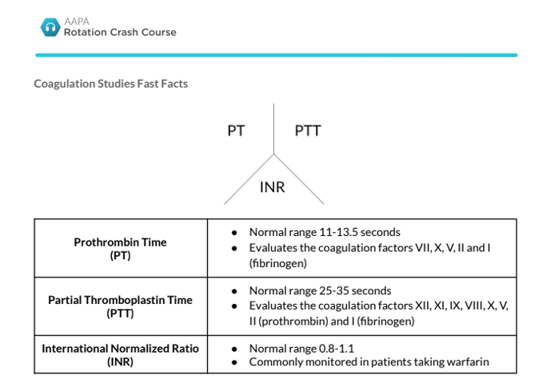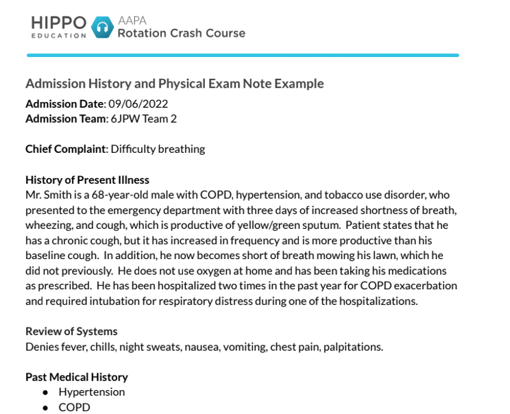The one-stop shop for clinical year success

PA Students, the clinical rotation year is an exciting and challenging time, as you’re finally able to apply all that you’ve learned in the didactic year to real-world patients. On the other hand, this year is also stressful and can feel overwhelming with all the changes and newness.
For over a decade I’ve been on PA faculty, and every year, the start of the clinical year brings up the same emotion in all of my students. I think the proper word for this emotion is “scited,” which was coined by author Glennon Doyle and is the combination of “scared” and “excited.”
All of my students ask the same questions… “What are my rotations going to be like?” “How do I not look like a doofus on the first day?” “What kind of questions are preceptors going to ask me?” And then, of course, the classic question, “What is going to be on the test?”
My Hippo PA team understands what it is like to feel “scited” about this year, because we’ve lived that experience, and walked hundreds of students through it.
Here’s my advice:
- Know where you’re going: the night before starting my rotation year, I did a dry run drive the night before so I knew the route, knew where to park, and had a visual of the clinic.
- Keep an open mind: some of my students are so sure they will love one rotation and loathe another that I make sure to tell them to have an open mind and to remember you will learn something new regardless.
- Take notes: It is 100% ok to say “I don’t know”, but always follow up “I don’t know” with “but I can look that up tonight” and then write the topic down. I found it helpful to carry a small notebook in my pocket, but any notetaking method is great.
We leaned on our years of advising students and partnered with AAPA to create two free resources to answer all of your questions and to take the “scared” out of “scited.”
- Listen to our AAPA Rotation Crash Course (RCC) podcast. We designed this podcast for you to soak in veteran practical advice the weekend before that anxiety-producing “first day” for each of your core rotations.
- Practice with our AAPA End of Rotation (EOR) Practice Exams. We designed these practice exams to improve your confidence and score going into the high-stakes exam at the end of each of your core rotations.
We know how important the first and last days of your rotations are and created this one-stop-shop for your clinical year success. Did we mention this is all free for AAPA members?
Digging a little deeper:
- The AAPA Rotation Crash Course podcast has rotation-specific episodes that break down each core rotation to ease your first-day jitters. We collected wisdom from dozens of practicing PAs, PAs who precept students, and new PA grads to help you feel more prepared. Each episode contains:
-
- Unique aspects of each rotation
- Tips on avoiding common student mistakes
- Common conditions encountered on each rotation
- Clinical pearls to help impress your preceptor, while taking exceptional care of your patients
Along with the audio episodes, this podcast comes with written show notes filled with essential information, such as medication tables, sample clinical notes, and answers to common preceptor questions.
The AAPA End of Rotation Practice Exams consist of 7 practice exams, one for each core rotation, providing high-quality practice for each core rotation exam. We know the stress of exams, the limited time to study during your rotations, as well as the consequences if you fail. Studying needs to be efficient and effective; practice questions need to be focused and challenging. Our exams:
- Model the PAEA EOR exams
- Cover the exact topics published on the PAEA blueprint
- Contain 120 questions per exam to mimic the real exam length
Designed to be taken in one sitting to simulate the real exam, each practice test helps you gauge your level of preparation and identify areas that need more attention. Best of all, these core rotation practice exams are free to AAPA members, making them an indispensable tool for everyone looking to ace their EOR exams.
Don’t let this dynamic duo pass you by. Here’s what our users have to say about RCC:
“I looked like a rockstar in my ED rotation after listening to and reviewing show notes. I was able to point out a maisonneuve fracture on X-ray and impressed 2 preceptors! It was amazing. I have many examples like that because of the rotation crash course podcast. I’m very thankful. “
“I listen to the podcasts on my drives to and from rotation and they help prepare me for what I see in clinic!”
And here are their comments about EOR:
“It has given me a direction for my studying for the EOR exams and shown me areas of weakness that I need additional practice in.”
“It has given me a second benchmark exam I take 1-3 days before the EOR. It makes me feel more secure in the clinical year.”
“Before I learned of the AAPA/HippoEd EOR I did poorly on my first EOR but since I learned about them I've been using them to practice before every EOR and they've all gone great since.”
Here’s to just being excited for your rotations. The clinical year is a lot, but we’re cheering you on every step of the way.
Practice-Changing Education
Experience education that goes beyond theory. Explore Hippo Education’s offerings below.



